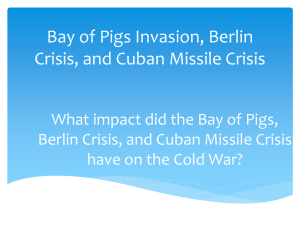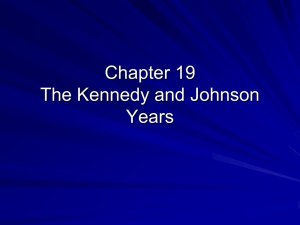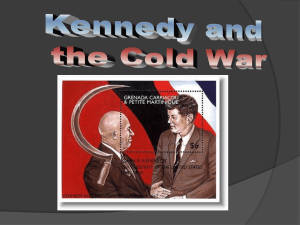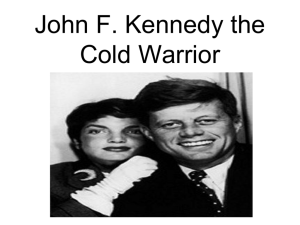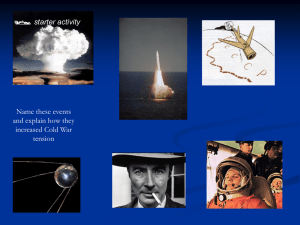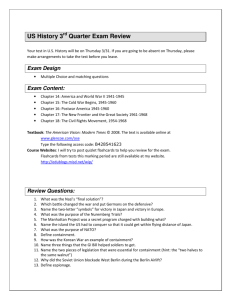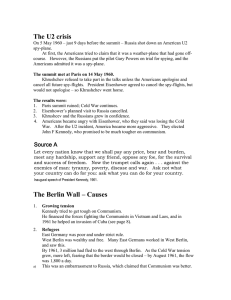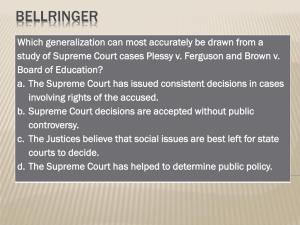Kennedy took a MUCH more aggressive stance
advertisement
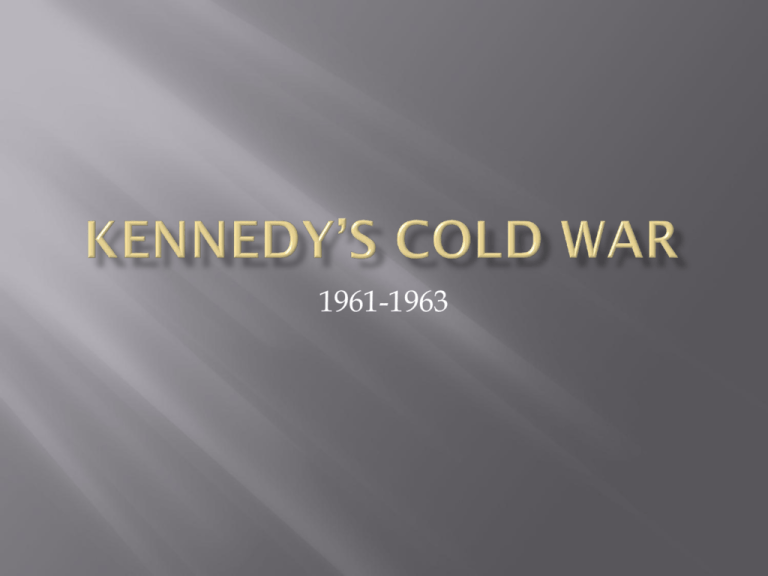
1961-1963 1953-1959 = Cuban Revolution overthrew dictator Fulgencio Batista 59’ - Fidel Castro – new leader many reforms Land reform – 75% foreign owned "Our revolution is endangering all American possessions in Latin America. We are telling these countries to make their own revolution." — Che Guevara, October 1962 Raul Castro & Che Guevara Eisenhower administration plan to train Cuban exiles for an invasion of their homeland March of 1960 - Camps in Guatemala were established Jose Miro Cardona, leader of the anti-Castro Cuban exiles in the United States = would lead afterwards It became common knowledge in Miami Kennedy was briefed during lame duck period February 1961 authorized BUT USA support had to be sufficiently disguised Moved location to “Bay of Pigs” Very cautious Assumption: 2 strikes, surprise, set up new government, people Cuba join in April 15, 1961 - Only 1 airstrike April 17 – land on beach & heavy fire Castro waiting with 20,000 Half US air support destroyed ; Kennedy tried to send more support but got there too late 1200 surrendered – 100 killed did not wipe out air force – WWII bombers 53 million dollars worth of baby food and drugs given to Castro for release of prisoners Dec 62’ first released “tear CIA to pieces and scatter to the wind” “too large to be clandestine and too small to be successful.” Your Kennedy, what now? Kennedy took a MUCH more aggressive stance retired General Maxwell Taylor made its report. "There can be no long-term living with Castro,“ "We will take action against Castro," Bobby wrote. "It might be tomorrow, it might be in five days or ten days, or not for months. But it will come." Operation Mongoose--a plan to sabotage and destabilize the Cuban government and economy, including the possible assassination of Castro himself Castro "the top priority of the U.S. government -- all else is secondary -- no time, money, effort, or manpower is to be spared, “ JFK ORTSAC – 62’ – mock invasion June 1961, Vienna summit - President Kennedy & Nikita Khrushchev increased tensions between the two superpowers “son older than you” – Khrushchev to Kennedy discussions regarding the divided city of Berlin. Khrushchev threatened blocking access to west Berlin Kennedy, “we seek peace, but we shall not surrender” By 1961, East lost nearly 2.5 million to the “economic miracle”/West Berlin. Losing workers August 13, 1961, the people of Berlin were awakened by the rumbling of heavy machinery barreling down their street toward the line that divided the eastern and western parts of the city – wood barbed wire fence Morning, a ring of Soviet troops surrounded the city. In one night, the freedom to pass between the two sections of Berlin had been abruptly halted. Less than nine months later, Khrushchev’s little fence turned into a concrete wall with watch towers, machine gun posts and even minefields. Khrushchev said, “It’s [the wall] not a very nice solution, but a wall is a hell of a lot better than war.” Kennedy sent 1500 troops to West Berlin 27 October 1961 Soviet and American troops pulled up on their respective sides of the Berlin Wall Checkpoint Charlie, located on the border between East and West Berlin main access point for Allied personnel and Westerners to cross the border After Berlin - "I know for certain that Kennedy doesn't have a strong background, nor, generally speaking, does he have the courage to stand up to a serious challenge." He also told his son that on Cuba, Kennedy "would make a fuss, make more of a fuss, and then agree" Eisenhower to Kennedy "the failure of the Bay of Pigs will embolden the Soviets to do something that they would otherwise not do.“ one Soviet adviser wrote about Kennedy, "too young, intellectual, not prepared well for decision making in crisis situations ... too intelligent and too weak."[ Reports of trucks carrying cylinders at night U.S. spy planes discovered Sovietmade medium-range nuclear missiles on Cuba Oct 14 – clear pictures of construction Cuba = ninety miles from the coast of Florida Why would the Soviets do this? Deterrent against US invasion of Cuba; counter threat to US missiles in Turkey; balance of power; Berlin Oct 15 – images processed/presented President consults with EXCOMM October 22 =U.S. warships began stopping Soviet vessels bound for Cuban shores "quarantine" rather than a blockade NSC & top advisors a blockade[of "navigation in international waters and air space" constituted "an act of aggression propelling human kind into the abyss of a world nuclear-missile war Negotiations , but still tense Finally, on October 27 a deal was struck Soviets agreed to remove their missiles from Cuba the United States promised not to invade Cuba Secretly, agree to withdraw missiles from Turkey Nov 20 – quarantine officially over! Mr. President, we and you ought not now to pull on the ends of the rope in which you have tied the knot of war, because the more the two of us pull, the tighter that knot will be tied. And a moment may come when that knot will be tied so tight that even he who tied it will not have the strength to untie it, and then it will be necessary to cut that knot, and what that would mean is not for me to explain to you, because you yourself understand perfectly of what terrible forces our countries dispose. Consequently, if there is no intention to tighten that knot and thereby to doom the world to the catastrophe of thermonuclear war, then let us not only relax the forces pulling on the ends of the rope, let us take measures to untie that knot. We are ready for this. Letter From Chairman Khrushchev to President Kennedy, October 26, Those 13 days were the closest to nuclear war MAD discussed Both Khrushchev and Kennedy began searching for ways to ease the enormous tension between the two superpowers In 1963 they established a hot line between the White House and the Kremlin Later that year, the superpowers signed a Limited Test Ban Treaty that served to ban nuclear testing in the atmosphere -Kennedy felt that Eisenhower had relied too heavily on nuclear weapons, which could only be used in extreme situations. -To allow for a “flexible response” if nations needed help against Communist movements, the president pushed for a buildup of conventional troops and weapons
